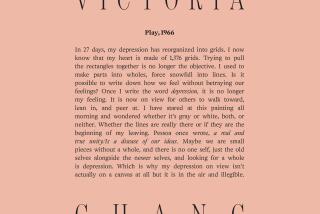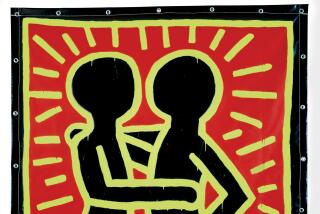Book review: ‘The Memory Chalet’
Nights were the worst. In September 2008, Tony Judt was diagnosed with ALS, also known as Lou Gehrig’s disease, a neurodegenerative condition that attacks first the arms and legs, then the breathing and speech of its victims. By December, Judt had lost the use of his hands; in March 2009, he was confined to a wheelchair and by May he needed a mask with tubes pumping air to stimulate his diaphragm to help him breathe. But the excruciating solitude and insomnia made his nights unbearable. In “Night,” the first of a series of essays for the New York Review of Books, Judt described the ordeal of bedtime — being rolled onto his cot, propped at a 110-degree angle, wedged into place with folded towels and pillows and left to “scroll through” his life.
One of the nation’s leading public intellectuals, Judt was inspired by historian Jonathan Spence’s 1984 book, “The Memory Palace of Matteo Ricci.” In that book, Spencer considers the work of Matteo Ricci, a Jesuit missionary to China whose pièce de résistance was his 1596 “Treatise on Mnemonic Arts.” Ricci’s advice involved the spatial association of words and images — by filling a “Memory Palace” with things to remember, literally room by room, you might stand a chance of holding on to them.
Using Chinese techniques for strengthening memory dating from the 16th century, Judt re-created in his mind a chalet in Switzerland he visited with his family as a child. Into each room in his memory palace, he would place paragraphs and reminiscences. In the mornings, he would go back through the chalet’s rooms and dictate these thoughts to an assistant.
Judt died on Aug. 6, 2010, at the age of 62, after ALS, a disease Judt likened to a hungry octopus, which took away the tools of his trade: Arms, legs, pencils, paper. The disease was on its way to taking Judt’s voice as well when he died. Left behind, however, was ample and delightful evidence of a lively mind: books, papers, a long association with the New York Review of Books, decades of young historians at New York University and, finally, this memoir, “The Memory Chalet.”
Food, cars, buses, trains, boats, words — Judt, who grew up in postwar Britain, remembers his favorite things and his most important moments. Many of the memories — and some of the liveliest — are from the years before he visited the Swiss village of Chesières with his parents, before he turned 10. There is a boyish delight in the speed and beauty of certain cars, the grandeur of the Lord Warden (the ferry from Dover to Calais), the “Northern European Jewish” food he ate at his grandparents’ house and later at King’s College in Cambridge: “braised beef and baked turnip, Chicken Tikka masala and pickled wollies swabbed in challah, Kingfisher beer and sweet lemon tea.” If he had to pick a single memory-triggering madeleine, he writes, it would be “naan dunked in matzoh ball soup.”
It is easy to forget, reading this memoir, that Judt is reconstructing his past even as he lies immobilized in a hospital bed. All the pieces move: glittering, tingling chapters are rich in smells and sights and sounds and movement, “After breakfast (on the Lord Warden, travelling from England to France) we would clamber up to the broad chilly decks (in those days the Channel seemed unforgivingly cold) and gaze impatiently at the horizon: Was that Cap Gris Nez? Boulogne appeared bright and sunny, in contrast to the low gray mist enshrouding Dover; one disembarked with the misleading impression of having traveled a great distance, arriving not in chilly Picardy but in the exotic South.” It’s enough to renew a reader’s faith in a writer’s ability to cut a path to immortality.
And then, in Parts Two and Three, Judt grows up. He goes to private school (“BBE,” Before the Beatles Era), where he encounters the expected anti-Semitism, then on to Cambridge, embraces Zionism, and spends large chunks of time on a kibbutz in Israel until the Six-Day War shatters his illusions. Judt remembers the glory of the Gauloise-smoking French intellectuals he drank with, his fascination with Eastern Europe (where the real death of communism, “the very Communist idea itself” first occurred), Berkeley in the late ‘60s, when Judt and his colleagues saw no problem being both radical and elite, and, of course, the four great cities in which he lived: London, New York, Vienna and Paris. He describes his intellectual community in New York — the staff and writers of the New York Review of Books, worldly and world wise in its coverage, “tangential to its point of origin.”
Judt worries, there at death’s door, about the fate of words in the Communication Age: “people talk like texts,” one of his children tells him. “When words lose their integrity — so do the ideas they express.” “I am fast losing control of words even as my relationship with the world has been reduced to them. They still form with impeccable discipline and unreduced range in the silence of my thoughts — the view from inside is as rich as ever — but I can no longer convey them with ease.”
“The view from inside is as rich as ever” — this seems worth working toward, worth considering as we live out our days. It’s a vote for the savored life but also for the life of the mind — a well-stocked pantry should the unthinkable befall us.
Salter Reynolds is a Los Angeles writer.
More to Read
Sign up for our Book Club newsletter
Get the latest news, events and more from the Los Angeles Times Book Club, and help us get L.A. reading and talking.
You may occasionally receive promotional content from the Los Angeles Times.






